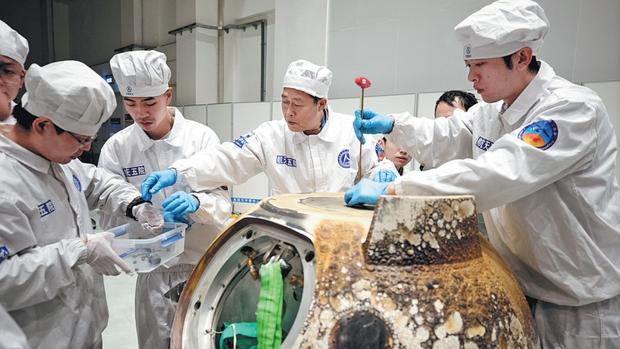 Scientists open the reentry capsule of the Chang'e 5 probe to extract the samples it brought back to Earth and weigh them at the Fifth Research Institute of the China Aerospace Science and Technology Corp on Dec 17. (JIN LIWANG / XINHUA)
Scientists open the reentry capsule of the Chang'e 5 probe to extract the samples it brought back to Earth and weigh them at the Fifth Research Institute of the China Aerospace Science and Technology Corp on Dec 17. (JIN LIWANG / XINHUA)
BEIJING - China on Monday unveiled regulations on lunar sample management, encouraging international cooperation on studying the samples brought back by the Chang'e-5 probe.
Released by the China National Space Administration (CNSA), the regulations cover general principles for preserving, managing, using, borrowing and returning the lunar samples, as well as information release and research results management of the samples.
Released by the China National Space Administration (CNSA), the regulations cover general principles for preserving, managing, using, borrowing and returning the lunar samples, as well as information release and research results management of the samples
According to the regulations, the lunar samples will be generally used for four purposes, namely permanent storage, backup permanent storage, research and public welfare.
The Chang'e-5 probe, comprising an orbiter, a lander, an ascender, and a returner, was launched on Nov 24, 2020. The return capsule landed in Inner Mongolia Autonomous Region on Dec. 17, retrieving about 1,731 grams of lunar samples.
ALSO READ: China's spacecraft brings home moon samples
China encourages international joint research in space science based on the lunar samples to support science results sharing, said Zhang Kejian, head of the CNSA, noting that the management and usage of the samples would comply with relevant international conventions.
Diplomats and representatives from France, Russia, the European Union, Asia Pacific Space Cooperation Organization and other countries and international organizations were invited to visit the lunar sample storage and processing facilities in the National Astronomical Observatories of China under the Chinese Academy of Sciences on Monday.
The CNSA also awarded commemorative plates to the international cooperators including the Argentine National Space Activities Commission, European Space Agency, Namibia Ministry of Higher Education, Training and Innovation, and Pakistan Space and Upper Atmosphere Research Commission, to thank them for their collaboration during the Chang'e-5 mission.
ALSO READ: Chang'e 5 embarks on journey to new frontier
Based on the principle of equality and mutual benefit, peaceful utilization and win-win cooperation, the CNSA has actively carried out international cooperation in lunar exploration, Mars exploration, satellite projects, and launch services, to promote the common progress and long-term sustainable development of the space industry, Zhang said.
"We are still in the pre-processing stage of the lunar samples, including sample unsealing, preparation and the establishment of archives," said Pei Zhaoyu, deputy director of Lunar Exploration and Space Engineering Center of CNSA.
About 80 percent of the lunar samples will be used for scientific research, and 20 percent will be preserved for better and more advanced scientific research methods and conditions in the future. This also constitutes protection of heritage of human civilization, Pei added.
China's future lunar and interplanetary exploration missions will be more open, and cooperation among countries will be further encouraged, Pei said.
READ MORE: China's Chang'e 5 probe prepares to land on moon
The success of the Chang'e-5 mission is not only the achievement of China but also the pride of the members of the Asia Pacific Space Cooperation Organization (APSCO), said Yu Qi, secretary general of the organization.
APSCO will organize scientists from the members of the organization to participate in the research teams of China and other countries. The lunar samples retrieved by Chang'e-5 will bring more opportunities for developing countries to study the moon, which is also a contribution to the progress of world science and technology, Yu said.
Robert Paluch, representative of the European Space Agency, also space counselor of France in China, said scientists from Europe will be involved in the lunar sample research and are looking forward to cooperating with China in following space missions.


